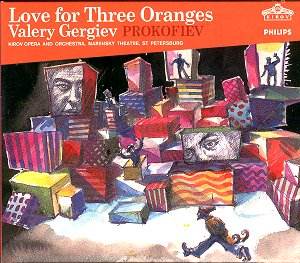Sergei PROKOFIEV
Love for Three
Oranges
 Soloists, Kirov Chorus
and Orchestra
Soloists, Kirov Chorus
and Orchestra
Conducted by Valery
Gergiev
 PHILIPS 462 913-2
[101.58]
PHILIPS 462 913-2
[101.58]
Crotchet
Amazon UK Amazon US

This 'Opera in a prologue and five acts' is the latest in Gergiev's superlative
traversal of Prokofiev's complete works for the stage with his Kirov Opera
for Philips. Recorded live in the fine acoustic of Amsterdam's Concertgebouw
in 1997 and 1998 and with a vocal cast made up almost entirely of native
Russian singers, this release has been anticipated with understandable impatience
and enthusiasm. Make no mistake the wait has been thoroughly worthwhile,
this is as fine a recording of Prokofiev's most popular operatic masterpiece
as one could imagine.
Composed whilst Prokofiev was on his way from Russia to the United States
at the end of the First World War and shortly after the Russian Revolution,
Love for Three Oranges was completed in the USA in 1919 for a proposed production
in Chicago, which was delayed for over a year due to the death of the director
of the opera company. Much has been written about Prokofiev's choice of French
for the language of the initial performances. He originally wrote the opera
to his own Russian language libretto, but, always the realist, he hedged
his bets by making a French version with an eye to the likelihood of Paris
soon taking up the opera, as the most free thinking city in Europe. As English
would not have been an acceptable language for the traditionally minded stateside
audiences and Russian politically suicidal, he felt that French would also
fit the bill nicely there and match the post romantic and satirical nature
of the work. It is something of an irony that Paris was not to see a production
of L'Amour des Trois Oranges until five years after his death. Of the many
strengths this new version has over the previous 1989 recording in French
from Kent Nagano and Lyon Opera, the generally perceived importance of Russian
over French is not really of such great import. It is, however, wonderful
to hear these hand picked voices bringing an extra sense of provocation and
danger (in addition to the easily perceived pantomime humour) in the Russian
language over the more cosmopolitan sounds of the French, something Prokofiev
the realist must, at heart, have known all along.
At this time of his life, Prokofiev was very much a composer determined to
bring change to what he perceived as a tired and outmoded art form. He found
the naturalistic approach taken, for example, by Stanislavsky at the Moscow
Arts Theatre to be at odds with the new world of post war and post revolutionary
western culture. He delighted in abandoning the aria and, indeed, goes so
far as to mutilate the opera's only love scene by introducing brusquely
irrelevant comments from the Greek-style commenting chorus who bring matters
also to a halt. Taking his cue from commedia dell'arte the opera is a whirlwind
which never lets up for a moment. The humour is real (witness the laughter
to be heard from a highly attentive and thankfully cough free audience) but
its sardonic nature is reinforced with some wonderfully telling changes of
pace and brilliant orchestration.
The soloists are all superb and Gergiev conducts with remarkable fluency
and a firm sense of direction. One hopes that a video from Philips from the
original Mariinsky production may also be on its way, otherwise the Lyon
Opera video is well worth seeking out, as Love for Three Oranges, more than
many other twentieth century operas, really needs to be seen as well as heard.
This is one of those occasions where one can only suggest, in the most positive
of ways, that anyone who knows only the famous March from Love for Three
Oranges or even all of Prokofiev's orchestral suite, should raid the piggy
bank and purchase this marvellous 2 CD set without delay.
Reviewer
Simon Foster

